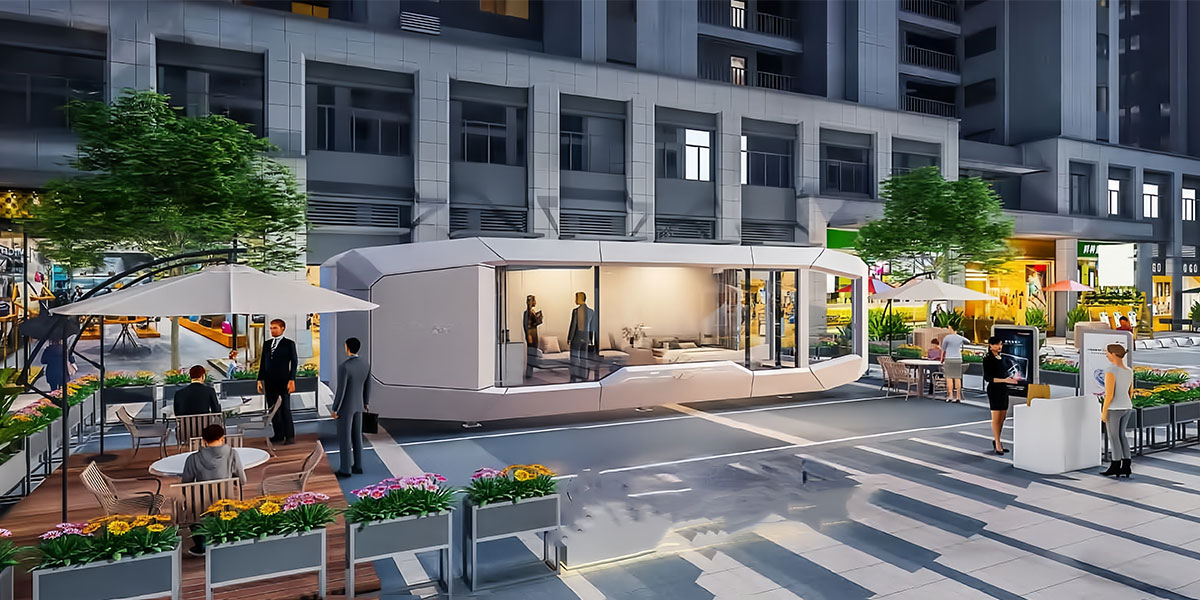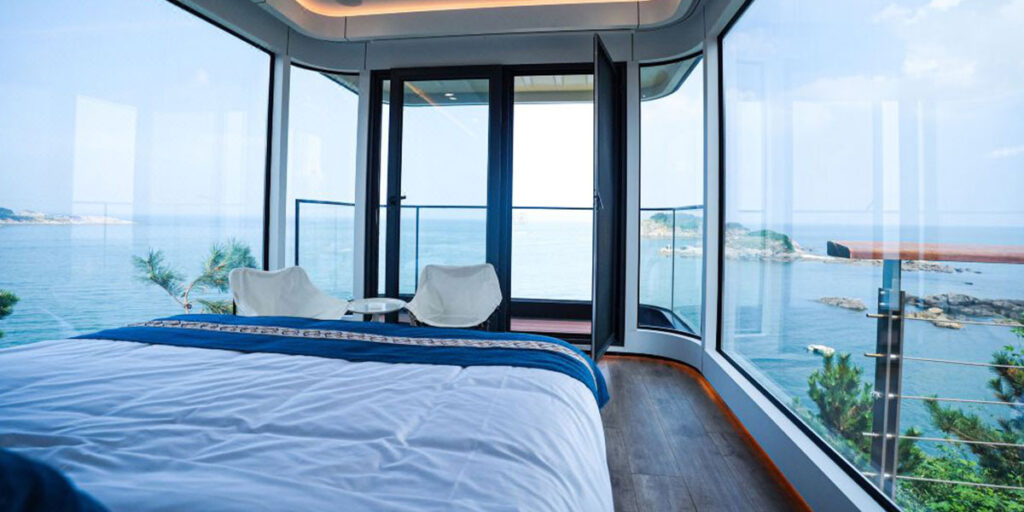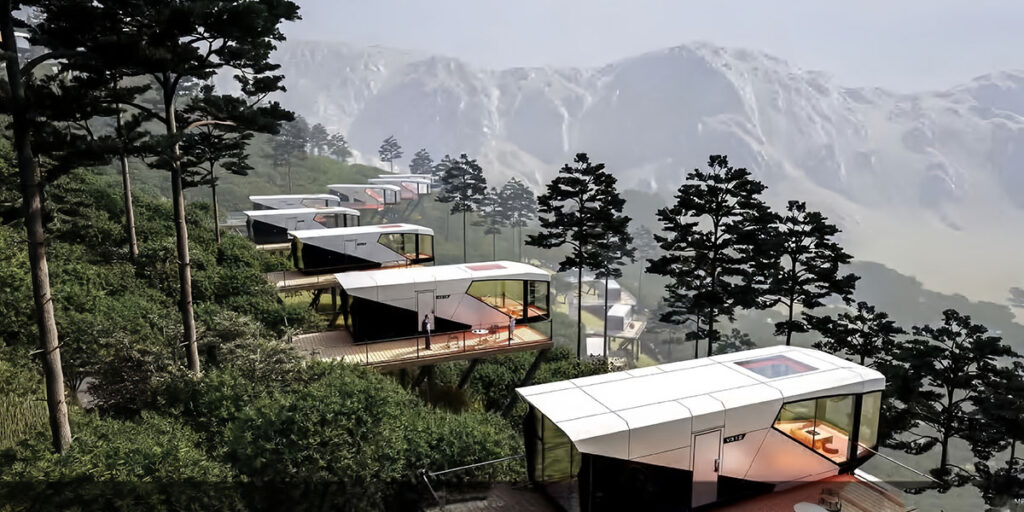
14 Jul What You Need to Know About Capsule House Pricing
Table of Contents
Capsule houses are a new way to solve housing problems. These small homes are cheap and useful, making them great for people who want to save money.
The average rent for capsule houses is $229 a month. This includes things like electricity and WiFi.
Simple models cost about $20,000, while regular ones go up to $50,000. Even fancy designs over $100,000 are still cheaper than normal houses.
Capsule houses are made for city people aged 25 to 45. They work well for those earning at least $500 a month. These homes are a smart choice in cities with not enough housing.
Key Takeaways
Capsule houses are cheap to live in, with rent about $229 a month and buying prices starting at $20,000.
Think about size and style when planning costs; smaller ones are cheaper, but special designs can cost more.
Where you put it matters; cities may cost more because of land and rules, while the countryside is often cheaper.
Capsule houses are built fast, taking only 3 to 4 months, which is quicker than regular homes.
Don’t forget extra costs like permits and hooking up utilities, which can add $1,000 to $10,000 to your expenses.
Capsule House Price Overview
Average Price Range
Capsule house prices change based on size, design, and materials. Small capsule homes (up to 200 sq ft) cost $30,000–$60,000. Medium ones (201–400 sq ft) range from $50,000–$90,000. Larger models (401–500 sq ft) cost $80,000–$130,000. Custom capsule houses with special designs can go over $200,000.
Here are some things that affect prices:
Location: Land prices and rules in the area matter.
Size and Design: Bigger and fancier designs cost more.
Materials: High-quality or eco-friendly materials may cost more but save later.
Utility Connections: Permit and setup costs differ by location.
Transportation: Remote places may have higher delivery fees.
Knowing these factors helps you plan your budget for a capsule house.
Examples of Capsule House Models
Capsule houses come in different types for various needs. Below are examples:
Type | Size | Price Range | Ideal For | Key Features |
|---|---|---|---|---|
Prefabricated | 200 – 500 sq ft | $30,000 – $100,000 | Budget buyers | Easy to build, affordable |
Custom-built | Varies | $100,000 – $200,000 | Unique design seekers | Personalized features |
Portable Units | 100 – 300 sq ft | $20,000 – $60,000 | Temporary or camping use | Lightweight, easy to move |
Luxury Models | 400 – 700 sq ft | $150,000 – $300,000 | High-end buyers | Fancy finishes, smart tech |
Commercial Use | Varies | $50,000 – $150,000 | Events or business use | Flexible, eco-friendly design |
For example, prefabricated models are quick and cheap to set up. Luxury models are for people who want fancy designs and smart features.
These examples show how capsule houses fit different budgets and lifestyles.
Regional Price Variations
Capsule house costs also depend on where you live. Cities with high land prices and strict rules cost more. Rural areas may be cheaper but have higher delivery fees.
For example, in cities like New York, permits and utility setup cost more. In the Midwest, fewer rules make capsule houses cheaper.
Local infrastructure also matters. Good utility systems lower setup costs. Remote areas need more money for connections.
By thinking about these regional differences, you can pick the best option for your budget and needs.
Features of a Space Capsule House and Their Impact on Cost

Size and Layout
The size and layout of capsule houses affect their price. Smaller models, like prefab ones, cost less. They use fewer materials and need less work. Bigger capsule houses with more rooms cost more. Complex layouts also raise the price.
Think about your needs when picking a size. A 200-square-foot house might suit one person. Families may need larger models. Layouts matter too. Open floor plans feel roomy but cost more to design.
Customization Options
Customization makes your capsule house special but adds to the cost. Custom houses may include built-in furniture or smart tech. Eco-friendly systems are also common but pricey. These features improve comfort and usability.
Prefab capsule houses have fewer custom options, keeping costs low. They are great for simple, affordable housing. If you want a unique design, custom capsule houses are worth the extra money.
Materials and Construction Quality
Materials used in capsule houses affect price and strength. Strong materials like steel cost more but last longer. Eco-friendly options, like bamboo, are sustainable but can be expensive.
Prefab houses use standard materials to stay affordable. Custom capsule houses let you pick high-end materials for a luxury feel. Balance quality and budget to get the best deal.
Capsule Houses vs. Other Housing Options
Traditional Homes
Capsule houses cost much less than regular homes. Traditional homes often cost $300,000 to $400,000. Capsule houses start at just $20,000, making them cheaper.
Building time is also shorter for capsule houses. Regular homes take about 8.6 months to build. Multifamily homes can take over 17 months. Capsule houses are ready in 3 to 4 months. This saves both time and labor costs.
If you want a cheaper and faster option, capsule houses are better than traditional homes.
Prefabricated and Tiny Homes
Capsule houses are like prefab and tiny homes but have extras. Prefab homes are built off-site and put together on your land. Capsule houses are similar but have smarter designs for city living.
Tiny homes focus on being small and eco-friendly. Capsule houses share these goals but offer more features. They include smart tech and green systems, making them modern and flexible.
If you want a small home, capsule houses mix the best of prefab and tiny homes with added perks.
Cost-Effectiveness
Capsule houses are great for saving money. Their small size and quick building process cut costs. They take only 3 to 4 months to finish, unlike regular homes that take longer.
They also save money on energy bills. Many have solar panels and good insulation. Their small size means less space to heat or cool, lowering costs further.
Choosing a capsule house gives you a modern home without spending too much. They are perfect for people looking for affordable housing.
Are Capsule Houses a Good Investment?

Benefits and Advantages
Capsule houses have many benefits that make them a smart choice. They are very strong because they use materials like steel and aluminum. These materials don’t rot or get damaged by bugs, so repairs cost less. Also, they don’t need much upkeep because they are built to last.
Another big plus is how fast they can be set up. You can build a capsule house in just two days. This saves time and money compared to regular homes. They also use less energy—about 65% less than normal houses. This means lower utility bills, which helps you save money.
Capsule houses can also help you earn extra income. Many people rent them out for short stays since they are unique and affordable. The short-term rental market is growing fast. It’s expected to go from $99.6 billion in 2021 to $228.9 billion by 2030. This makes capsule houses a great way to increase property value.
Benefit | Description |
|---|---|
Durability | Made with steel and aluminum, they resist rot and bugs, lowering repair costs. |
Quick Installation | Can be built in about two days, saving time and money. |
Low Maintenance | Strong materials mean less upkeep compared to regular homes. |
Drawbacks to Consider
Capsule houses have some downsides you should think about. One issue is their small size. They are made to be compact, which might not work for big families or people who want more space. Think about your needs before buying one.
Another problem is zoning and permits. Some places have strict rules that make it hard to install these homes. Check local laws before deciding to buy.
Adding custom features can also raise the price. Basic models are cheap, but extras like smart tech or eco-friendly systems cost more. Make sure to balance what you want with what you can afford.
Lastly, not everyone likes capsule houses. This could make it harder to sell them in some areas. If you plan to sell or rent, know your audience first.
Resale Value and Market Trends
Capsule houses are a good long-term investment. Their market is growing quickly. By 2024, the market size will reach $117.4 million. By 2033, it’s expected to grow to $252.9 million, with an annual growth rate of 8.46% from 2025 to 2033.
Metric | Value |
|---|---|
Market Size (2024) | $117.4 Million |
Projected Market Size (2033) | $252.9 Million |
Growth Rate (CAGR 2025-2033) | 8.46% |
Capsule houses also pay for themselves faster than other housing types. For example, setting up a capsule house costs $20,000 to $30,000, and it lasts 60 years. With nightly rental rates of $100 to $180, you can earn back your money in 1.5 to 2.5 years. This makes them a smart choice for earning steady income.
Accommodation Type | Avg. Setup Cost (per unit) | Lifespan | Maintenance | Nightly Rate | Payback Period |
|---|---|---|---|---|---|
Canvas Tent | $2,000–$4,000 | 1–3 years | High | $30–$60 | 2–3 years |
Glamping Yurt/Dome | $8,000–$15,000 | 5–7 years | Medium | $80–$120 | 2–4 years |
Wooden Cabin | $25,000–$45,000 | 20+ years | High | $150–$250 | 6–8 years |
Space Capsule House | $20,000–$30,000 | 60 years | Low | $100–$180 | 1.5–2.5 years |
Capsule houses match today’s market trends and are a safe investment. They are affordable, strong, and can help you earn money. This makes them a great option for smart investors.
Extra Costs Besides the Capsule House Price
When buying a capsule house, think about extra costs. These depend on where you live, the house type, and your needs. Below is a list of common extra expenses.
Permits and Rules
You must check local rules before placing your capsule house. Some places have strict laws about small or eco-friendly homes. For example, cities may need special permits. Permit fees range from $500 to $5,000, depending on the area. Researching these rules early can save you money and time.
Repairs and Upkeep
Capsule houses are strong but still need care. Over time, you might fix things like windows or doors. Yearly upkeep costs are usually $200 to $1,000. Using good materials, like steel, can lower these costs. Steel resists rust and damage, making it a smart choice for long-lasting homes.
Utility Connections
Connecting water, power, and internet is another cost to plan for. If your house is far from utilities, setup can be pricey. These costs range from $1,000 to $10,000. Many capsule houses include solar panels, which cut energy bills. These systems save money and help the environment.
Knowing these costs helps you plan better. By including them in your budget, you can make a smart choice about your capsule house.
Capsule houses are a cheap and flexible way to live. Their cost changes based on size, design, and location. They are a good choice for saving money. But, extra costs like permits and utilities should be planned for. Knowing all about capsule house prices helps you pick what fits your needs and budget.
FAQ
How long does a capsule house last?
Capsule houses can last up to 60 years. Strong materials like steel and aluminum make them durable. Doing regular maintenance, like sealing cracks and fixing wear, keeps them in good shape.
Can you make changes to a capsule house?
Yes, capsule houses can be customized. You can add built-in furniture, eco-friendly features, or smart tech. Prefab models have fewer options, but custom-built ones let you personalize more.
Are capsule houses safe in bad weather?
Capsule houses are built to handle tough weather. Steel frames make them strong against wind and rain. In earthquake or flood zones, extra reinforcements might be needed.
Do you need permits for capsule houses?
Yes, permits are usually needed for capsule houses. Permit fees range from $500 to $5,000, depending on local rules. Always check zoning laws and building codes before buying one.
Can you move a capsule house?
Many capsule houses can be moved. Lightweight ones, like portable units, are easy to relocate. Bigger or custom designs may need experts and extra costs to move.
Tip: Check moving rules and costs before relocating your capsule house.



